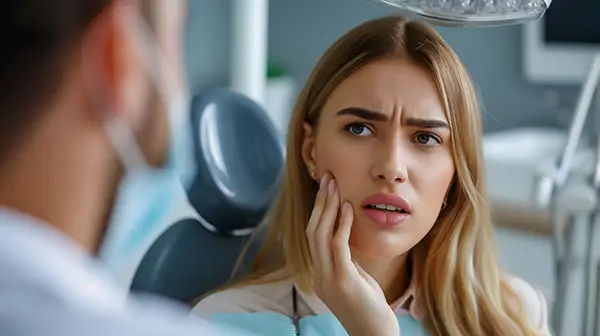When Do You Need to Start Having Regular Oral Cancer Screenings?
Posted on 7/15/2025 by Mountain State Oral and Facial Surgery |
 Oral cancer is a serious condition that affects thousands of people each year. While anyone can develop it, certain risk factors can increase your odds. Early detection is critical, as it significantly improves treatment success and survival rates. That's where oral cancer screenings come in. Oral cancer is a serious condition that affects thousands of people each year. While anyone can develop it, certain risk factors can increase your odds. Early detection is critical, as it significantly improves treatment success and survival rates. That's where oral cancer screenings come in.
Why are Oral Cancer Screenings Important?
Regular oral cancer screenings are crucial for detecting the disease at its earliest stage, when it's most treatable. During a screening, your oral surgeon will examine your mouth, tongue, throat, and neck for any abnormalities. They will also discuss your oral care habits and any risk factors you might have.
Early detection of oral cancer allows for less invasive and more effective treatment options, such as surgery or radiation therapy. It also improves your chances of a full recovery. In contrast, late-stage oral cancer requires more extensive treatments and may have a lower survival rate.
When Should You Start Getting Screened?
The American Dental Association recommends that adults with average risk start having oral cancer screenings every three years from age 20. However, if you have any of the following risk factors, you should talk to your oral surgeon about starting screenings earlier and increasing the frequency:
| • |
Tobacco use: Smoking, chewing tobacco, and other forms of tobacco use significantly increase your risk of oral cancer. |
| • |
Heavy alcohol use: Drinking excessive amounts of alcohol can also increase your risk. |
| • |
HPV infection: Certain strains of the human papillomavirus (HPV) have been linked to oral cancer. |
| • |
Sun exposure: Excessive sun exposure can increase the risk of lip cancer. |
| • |
Poor diet: A diet low in fruits and vegetables may increase your risk. |
| • |
Family history of oral cancer: If you have a family member who has had oral cancer, you are at increased risk. |
| • |
Precancerous lesions: If you have any precancerous lesions in your mouth, you need to be monitored closely. |
What Happens During an Oral Cancer Screening?
Oral cancer screenings are quick, painless, and non-invasive. Your oral surgeon will:
| • |
Examine your mouth, tongue, throat, and neck for any abnormalities. |
| • |
Feel for any lumps or swollen lymph nodes. |
| • |
Discuss your oral care habits and any risk factors you may have. |
| • |
Ask about any symptoms you've been experiencing, such as mouth pain, difficulty swallowing, or changes in your voice. |
If any suspicious areas are found, your oral surgeon may recommend further testing, such as a biopsy. This will help determine if the cells are cancerous and guide the appropriate treatment plan.
Take Charge of Your Oral Health
Oral cancer screenings are an essential part of maintaining good oral health. By getting screened regularly, you can increase your chances of early detection and successful treatment. Talk to your oral surgeon today about scheduling your first oral cancer screening. Remember, early detection saves lives.
|
|